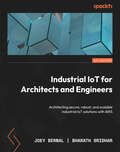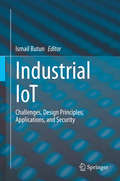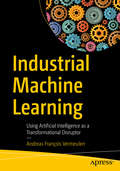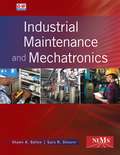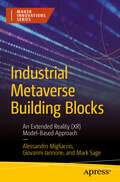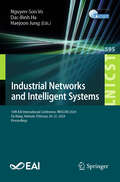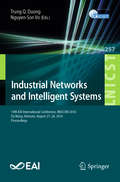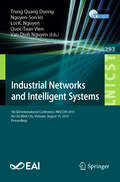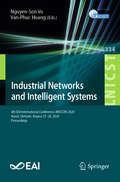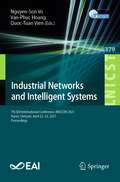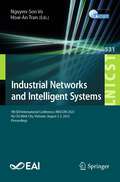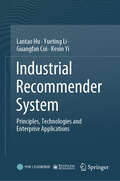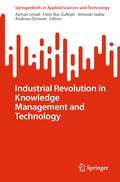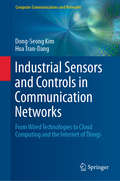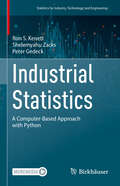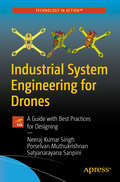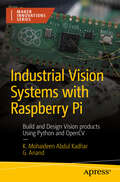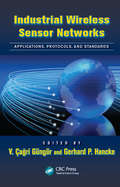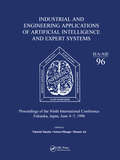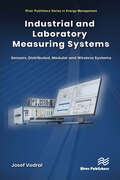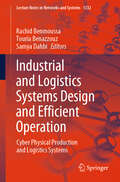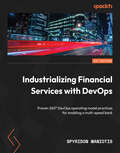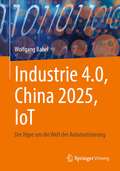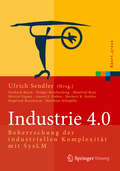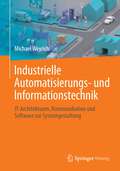- Table View
- List View
Industrial IoT for Architects and Engineers: Architecting secure, robust, and scalable industrial IoT solutions with AWS
by Joey Bernal Bharath SridharGo beyond connecting services to understand the unique challenges encountered in industrial environments by building Industrial IoT architectures using AWSPurchase of the print or kindle book includes a free eBook in the PDF formatKey FeaturesUnderstand the key components of IoT Architecture and how it applies to Industry 4.0Walk through extensive examples and solutions across multiple IndustriesLearn how to collect, process, store, and analyse Industrial IoT dataBook DescriptionWhen it comes to using the core and managed services available on AWS for making decisions about architectural environments for an enterprise, there are as many challenges as there are advantages. This Industrial IoT book follows the journey of data from the shop floor to the boardroom, identifying goals and aiding in strong architectural decision-making.You'll begin from the ground up, analyzing environment needs and understanding what is required from the captured data, applying industry standards and conventions throughout the process. This will help you realize why digital integration is crucial and how to approach an Industrial IoT project from a holistic perspective. As you advance, you'll delve into the operational technology realm and consider integration patterns with common industrial protocols for data gathering and analysis with direct connectivity to data through sensors or systems. The book will equip you with the essentials for designing industrial IoT architectures while also covering intelligence at the edge and creating a greater awareness of the role of machine learning and artificial intelligence in overcoming architectural challenges.By the end of this book, you'll be ready to apply IoT directly to the industry while adapting the concepts covered to implement AWS IoT technologies.What you will learnDiscover Industrial IoT best practices and conventionsUnderstand how to get started with edge computingDefine and build IoT solution architectures from scratchUse AWS as the core of your solution platformApply advanced analytics and machine learning to your dataDeploy edge processing to react in near real time to events within your environmentWho this book is forThis book is for architects, engineers, developers, and technical professionals interested in building an edge and cloud-based Internet of Things ecosystem with a focus on industry solutions. Since the focus of this book is specifically on IoT, a solid understanding of core IoT technologies and how they work is necessary to get started. If you are someone with no hands-on experience, but are familiar with the subject, you'll find the use cases useful to learn how architectural decisions are made.
Industrial IoT: Challenges, Design Principles, Applications, and Security
by Ismail ButunProliferation of Internet of Things (IoT) enabled rapid enhancements for the applications not only in home and environment scenarios, but also in factory automation. Now, Industrial Internet of Things (IIoT) offers all the advantages of IoT to the industrial scenarios, applications ranging from remote sensing and actuating to de-centralization and autonomy. In this book, the editor aims at presenting the IIoT and its place during the industrial revolution (Industry 4.0), while they are taking us to a better, sustainable, automated and safer world. The book covers the cross relations and implications of IIoT with existing wired/wireless communication/networking and safety technologies of the Industrial Networks. Moreover, practical use-case scenarios from the industry, for the application of IIoT on smart factories, smart cities and smart grid are presented. Especially, IoT-driven advances in commercial and industrial building lighting and in street lighting are presented as a specific example to shed light on the application domain of IIoT.The state of the art in Industrial Automation is also presented not only to give a better understanding of the enabling technologies, potential advantages and challenges of the Industry 4.0 and IIoT but also to foster interest on exploring this promising area. Finally yet importantly, the security section of the book covers the cyber-security related needs of the IIoT users and the services that might address these needs. First, user privacy, data ownership, proprietary information handling related to IIoT networks are investigated. Then, the intrusion prevention, detection and mitigation part conclude the book.
Industrial Machine Learning: Using Artificial Intelligence as a Transformational Disruptor
by Andreas François VermeulenUnderstand the industrialization of machine learning (ML) and take the first steps toward identifying and generating the transformational disruptors of artificial intelligence (AI). You will learn to apply ML to data lakes in various industries, supplying data professionals with the advanced skills required to handle the future of data engineering and data science. Data lakes currently generated by worldwide industrialized business activities are projected to reach 35 zettabytes (ZB) as the Fourth Industrial Revolution produces an exponential increase of volume, velocity, variety, variability, veracity, visualization, and value. Industrialization of ML evolves from AI and studying pattern recognition against the increasingly unstructured resource stored in data lakes. Industrial Machine Learning supplies advanced, yet practical examples in different industries, including finance, public safety, health care, transportation, manufactory, supply chain, 3D printing, education, research, and data science. The book covers: supervised learning, unsupervised learning, reinforcement learning, evolutionary computing principles, soft robotics disruptors, and hard robotics disruptors. What You Will Learn Generate and identify transformational disruptors of artificial intelligence (AI)Understand the field of machine learning (ML) and apply it to handle big data and process the data lakes in your environmentHone the skills required to handle the future of data engineering and data science Who This Book Is For Intermediate to expert level professionals in the fields of data science, data engineering, machine learning, and data management
Industrial Maintenance And Mechatronics
by Shawn A. Ballee Gary R. ShearerIndustrial Maintenance and Mechatronics is a comprehensive, standards-based text that provides curriculum support for college-level Industrial Technology Maintenance (ITM) programs. The text carries the exclusive endorsement of NIMS and prepares students to earn up to nine of the nationally-recognized ITM credentials from NIMS.
Industrial Metaverse Building Blocks: An Extended Reality (XR) Model-Based Approach (Maker Innovations Series)
by Alessandro Migliaccio Giovanni Iannone Mark SageExplore the Metaverse’s role in centralizing industrial data. This book introduces the methodology and applications of extended reality (XR) technologies in the life cycle of complex systems as a natural part of model-based systems engineering (MBSE). The integration of extended realities within the Metaverse opens up new possibilities for immersive experiences and enhanced collaboration, making them an indispensable tool to optimize the workflow in large organizations and SMEs. Virtual reality (VR) and augmented reality (AR) technologies enable users to interact with digital models in a more intuitive manner. Starting with the basis of model-based systems engineering, the book is structured into six building blocks (chapters) that outline the process needed to understand how to create and support industrial activities using immersive technology. You’ll see how teams can collaborate remotely in shared virtual spaces, breaking down geographical, language, and shared content barriers while fostering creativity and innovation. Interviews are then provided in chapter 7, in which experts share their experiences deploying the building blocks of the Metaverse in their organization. Industrial Metaverse Building Blocks offers practical insights into the benefits and implementation of mixed reality, guiding you on effectively integrating the technology into your organization to drive innovation and achieve strategic goals. What You Will Learn Access real-time data, ensuring accuracy for stakeholders Utilize 3D and AI for model-based simulations Enhance collaboration through VR and AR integration Implement Model-Based Systems Engineering for industrial tech Increase the efficiency of system engineering/product development with XR/MBSE technology Who This Book Is For Innovation teams, CTOs, CIOs, business unit leads, consultants in XR and Systems Engineering, and vision and strategy creators.
Industrial Networks and Intelligent Systems: 10th EAI International Conference, INISCOM 2024, Da Nang, Vietnam, February 20–21, 2024, Proceedings (Lecture Notes of the Institute for Computer Sciences, Social Informatics and Telecommunications Engineering #595)
by Nguyen-Son Vo Dac-Binh Ha Haejoon JungThis book constitutes the refereed proceedings of the 10th EAI International Conference on INISCOM 2024, held in Da Nang, Vietnam, during February 20–21, 2024. The 18 full papers included in this book were carefully reviewed and selected from 41 submissions. They were organized in topical sections as follows: industrial networks and intelligent systems; telecommunications systems and networks; information processing and data analysis; security and privacy.
Industrial Networks and Intelligent Systems: 14th Eai International Conference, Iniscom 2018, Da Nang, Vietnam, August 27 - 28, 2018, Proceedings (Lecture Notes of the Institute for Computer Sciences, Social Informatics and Telecommunications Engineering #257)
by Trung Q. Duong Nguyen-Son VoThis book constitutes the refereed proceedings of the 4th EAI International Conference on Industrial Networks and Intelligent Systems, INISCOM 2018, held in Da Nang, Vietnam, in August 2018. The 26 full papers were selected from 38 submissions and are organized thematically in tracks: Telecommunications Systems and Networks; Industrial Networks and Applications; Hardware and Software Design and Development; Information Processing and Data Analysis; Signal Processing; Security and Privacy.
Industrial Networks and Intelligent Systems: 5th EAI International Conference, INISCOM 2019, Ho Chi Minh City, Vietnam, August 19, 2019, Proceedings (Lecture Notes of the Institute for Computer Sciences, Social Informatics and Telecommunications Engineering #293)
by Nguyen-Son Vo Trung Quang Duong Loi K. Nguyen Quoc-Tuan Vien Van-Dinh NguyenThis book constitutes the refereed proceedings of the 5th EAI International Conference on Industrial Networks and Intelligent Systems, INISCOM 2019, held in Ho Chi Minh City, Vietnam, in August 2019. The 25 full papers were selected from 39 submissions and are organized thematically in tracks on telecommunications systems and networks; industrial networks and applications; hardware and software design and development; information processing and data analysis; signal processing; security and privacy.
Industrial Networks and Intelligent Systems: 6th EAI International Conference, INISCOM 2020, Hanoi, Vietnam, August 27–28, 2020, Proceedings (Lecture Notes of the Institute for Computer Sciences, Social Informatics and Telecommunications Engineering #334)
by Nguyen-Son Vo Van-Phuc HoangThis book constitutes the refereed proceedings of the 6th EAI International Conference on Industrial Networks and Intelligent Systems, INISCOM 2020, held in Hanoi, Vietnam, in August 2020. Due to COVID-19 pandemic the conference was held virtually. The 26 full papers were selected from 59 submissions and are organized thematically in tracks on telecommunications systems and networks; hardware, software and application designs; information processing and data analysis; industrial networks and intelligent systems; security and privacy.
Industrial Networks and Intelligent Systems: 7th EAI International Conference, INISCOM 2021, Hanoi, Vietnam, April 22-23, 2021, Proceedings (Lecture Notes of the Institute for Computer Sciences, Social Informatics and Telecommunications Engineering #379)
by Nguyen-Son Vo Quoc-Tuan Vien Van-Phuc HoangThis book constitutes the refereed proceedings of the 7th EAI International Conference on Industrial Networks and Intelligent Systems, INISCOM 2021, held in Hanoi, Vietnam, in April 2021.The 39 full papers were selected from XX submissions and are organized thematically in tracks on telecommunications systems and networks; hardware, software and application designs; information processing and data analysis; industrial networks and intelligent systems; security and privacy.
Industrial Networks and Intelligent Systems: 9th EAI International Conference, INISCOM 2023, Ho Chi Minh City, Vietnam, August 2-3, 2023, Proceedings (Lecture Notes of the Institute for Computer Sciences, Social Informatics and Telecommunications Engineering #531)
by Nguyen-Son Vo Hoai-An TranThis book constitutes the refereed proceedings of the 9th EAI International Conference on Industrial Networks and Intelligent Systems, INISCOM 2023, held in Ho-Chi-Minh City, Vietnam, during August 2-3, 2023. The 23 full papers were selected from 55 submissions and are organized thematically in tracks on telecommunications systems and networks; information processing and data analysis; industrial networks and intelligent systems; security and privacy.
Industrial Recommender System: Principles, Technologies and Enterprise Applications
by Lantao Hu Yueting Li Guangfan Cui Kexin YiRecommender systems, as a highly popular AI technology in recent years, have been widely applied across various industries. They have transformed the way we interact with technology, influencing our choices and shaping our experiences. This book provides a comprehensive introduction to industrial recommender systems, starting with the overview of the technical framework, gradually delving into each core module such as content understanding, user profiling, recall, ranking, re-ranking and so on, and introducing the key technologies and practices in enterprises. The book also addresses common challenges in recommendation cold start, recommendation bias and debiasing. Additionally, it introduces advanced technologies in the field, such as reinforcement learning, causal inference. Professionals working in the fields of recommender systems, computational advertising, and search will find this book valuable. It is also suitable for undergraduate, graduate, and doctoral students majoring in artificial intelligence, computer science, software engineering, and related disciplines. Furthermore, it caters to readers with an interest in recommender systems, providing them with an understanding of the foundational framework, insights into core technologies, and advancements in industrial recommender systems. The translation was done with the help of artificial intelligence. A subsequent human revision was done primarily in terms of content.
Industrial Revolution in Knowledge Management and Technology (SpringerBriefs in Applied Sciences and Technology)
by Andreas Öchsner Azman Ismail Fatin Nur Zulkipli Jimisiah JaafarThis book addresses various aspects of knowledge management and technological advances that are driving the ongoing industrial revolution. This revolution is being driven by the rapid development of several key technologies, particularly in the areas of artificial intelligence, robotics, Big Data, the Internet of Things, nanotechnology, and biotechnology. Another most important and useful concept is knowledge management because modern organizations rely on knowledge and its development to achieve long-term benefits. Therefore, different research directions can have a significant impact on the industrial revolution and its results.
Industrial Sensors and Controls in Communication Networks: From Wired Technologies To Cloud Computing And The Internet Of Things (Computer Communications and Networks)
by Dong-Seong Kim Hoa Tran-DangThis informative text/reference presents a detailed review of the state of the art in industrial sensor and control networks. The book examines a broad range of applications, along with their design objectives and technical challenges. The coverage includes fieldbus technologies, wireless communication technologies, network architectures, and resource management and optimization for industrial networks. Discussions are also provided on industrial communication standards for both wired and wireless technologies, as well as for the Industrial Internet of Things (IIoT).Topics and features: describes the FlexRay, CAN, and Modbus fieldbus protocols for industrial control networks, as well as the MIL-STD-1553 standard; proposes a dual fieldbus approach, incorporating both CAN and ModBus fieldbus technologies, for a ship engine distributed control system; reviews a range of industrial wireless sensor network (IWSN) applications, from environmental sensing and condition monitoring, to process automation; examines the wireless networking performance, design requirements, and technical limitations of IWSN applications; presents a survey of IWSN commercial solutions and service providers, and summarizes the emerging trends in this area; discusses the latest technologies and open challenges in realizing the vision of the IIoT, highlighting various applications of the IIoT in industrial domains; introduces a logistics paradigm for adopting IIoT technology on the Physical Internet.This unique work will be of great value to all researchers involved in industrial sensor and control networks, wireless networking, and the Internet of Things.
Industrial Statistics: A Computer-Based Approach with Python (Statistics for Industry, Technology, and Engineering)
by Shelemyahu Zacks Ron S. Kenett Peter GedeckThis innovative textbook presents material for a course on industrial statistics that incorporates Python as a pedagogical and practical resource. Drawing on many years of teaching and conducting research in various applied and industrial settings, the authors have carefully tailored the text to provide an ideal balance of theory and practical applications. Numerous examples and case studies are incorporated throughout, and comprehensive Python applications are illustrated in detail. A custom Python package is available for download, allowing students to reproduce these examples and explore others.The first chapters of the text focus on the basic tools and principles of process control, methods of statistical process control (SPC), and multivariate SPC. Next, the authors explore the design and analysis of experiments, quality control and the Quality by Design approach, computer experiments, and cybermanufacturing and digital twins. The text then goes on to cover reliability analysis, accelerated life testing, and Bayesian reliability estimation and prediction. A final chapter considers sampling techniques and measures of inspection effectiveness. Each chapter includes exercises, data sets, and applications to supplement learning.Industrial Statistics: A Computer-Based Approach with Python is intended for a one- or two-semester advanced undergraduate or graduate course. In addition, it can be used in focused workshops combining theory, applications, and Python implementations. Researchers, practitioners, and data scientists will also find it to be a useful resource with the numerous applications and case studies that are included. A second, closely related textbook is titled Modern Statistics: A Computer-Based Approach with Python. It covers topics such as probability models and distribution functions, statistical inference and bootstrapping, time series analysis and predictions, and supervised and unsupervised learning. These texts can be used independently or for consecutive courses.This book is part of an impressive and extensive write up enterprise (roughly 1,000 pages!) which led to two books published by Birkhäuser. This book is on Industrial Statistics, an area in which the authors are recognized as major experts. The book combines classical methods (never to be forgotten!) and “hot topics” like cyber manufacturing, digital twins, A/B testing and Bayesian reliability. It is written in a very accessible style, focusing not only on HOW the methods are used, but also on WHY. In particular, the use of Python, throughout the book is highly appreciated. Python is probably the most important programming language used in modern analytics. The authors are warmly thanked for providing such a state-of-the-art book. It provides a comprehensive illustration of methods and examples based on the authors longstanding experience, and accessible code for learning and reusing in classrooms and on-site applicationsProfessor Fabrizio RuggeriResearch Director at the National Research Council, ItalyPresident of the International Society for Business and Industrial Statistics (ISBIS)Editor-in-Chief of Applied Stochastic Models in Business and Industry (ASMBI)
Industrial System Engineering for Drones: A Guide with Best Practices for Designing
by Neeraj Kumar Singh Porselvan Muthukrishnan Satyanarayana SanpiniExplore a complex mechanical system where electronics and mechanical engineers work together as a cross-functional team. Using a working example, this book is a practical “how to” guide to designing a drone system.As system design becomes more and more complicated, systematic, and organized, there is an increasingly large gap in how system design happens in the industry versus what is taught in academia. While the system design basics and fundamentals mostly remain the same, the process, flow, considerations, and tools applied in industry are far different than that in academia. Designing Drone Systems takes you through the entire flow from system conception to design to production, bridging the knowledge gap between academia and the industry as you build your own drone systems.What You’ll LearnGain a high level understanding of drone systemsDesign a drone systems and elaborating the various aspects and considerations of designReview the principles of the industrial system design process/flow, and the guidelines for drone systemsLook at the challenges, limitations, best practices, and patterns of system designWho This Book Is ForPrimarily for beginning or aspiring system design experts, recent graduates, and system design engineers. Teachers, trainers, and system design mentors can also benefit from this content.
Industrial Vision Systems with Raspberry Pi: Build and Design Vision products Using Python and OpenCV (Maker Innovations Series)
by G. Anand K. Mohaideen Abdul KadharToday’s industries are faced with a growing demand for vision systems due to their non-invasive characteristics in inspecting product quality. These systems identify surface defects and faults, and verify components’ orientation and their measurements, etc. This book explores the vision techniques needed to design and develop your own industrial vision system with the help of Raspberry Pi.You’ll start by reviewing basic concepts and applications of machine vision systems, followed by the preliminaries of Python, OpenCV, required libraries, and installing OpenCV for Python on Raspberry Pi. These are used when implementing image processing for the system applications. You’ll then look at interfacing techniques and some of the challenges industrial vision systems encounter, such as lighting and camera angles. Algorithms and image processing techniques are also discussed, along with machine learning and deep learning techniques. Later chapters explain the use of GUI apps and real-time applications of Industrial vision systems. Each chapter concludes with examples and demo implementations to facilitate your knowledge of the concepts. By the end of the book, you’ll be able to build and deploy computer vision applications with Python, OpenCV, and Raspberry Pi.What You'll LearnBuild and deploy industrial vision system using Raspberry Pi and Python programmingExplore computer vision techniques using Raspberry Pi and OpenCVImplement popular vision techniques for industrial applications in real timeReview modern image processing techniques such as image segmentation, thresholding, and contoursWho This Book Is ForRaspberry Pi and Python enthusiasts interested in computer vision applications; educators, industrialists, and industrial solution providers who want to design vision-based testing products with the help of Raspberry Pi
Industrial Wireless Sensor Networks: Applications, Protocols, and Standards (Industrial Electronics)
by V. Çağri Güngör Gerhard P. Hancke.The collaborative nature of industrial wireless sensor networks (IWSNs) brings several advantages over traditional wired industrial monitoring and control systems, including self-organization, rapid deployment, flexibility, and inherent intelligent processing. In this regard, IWSNs play a vital role in creating more reliable, efficient, and productive industrial systems, thus improving companies’ competitiveness in the marketplace. Industrial Wireless Sensor Networks: Applications, Protocols, and Standards examines the current state of the art in industrial wireless sensor networks and outlines future directions for research. What Are the Main Challenges in Developing IWSN Systems? Featuring contributions by researchers around the world, this book explores the software and hardware platforms, protocols, and standards that are needed to address the unique challenges posed by IWSN systems. It offers an in-depth review of emerging and already deployed IWSN applications and technologies, and outlines technical issues and design objectives. In particular, the book covers radio technologies, energy harvesting techniques, and network and resource management. It also discusses issues critical to industrial applications, such as latency, fault tolerance, synchronization, real-time constraints, network security, and cross-layer design. A chapter on standards highlights the need for specific wireless communication standards for industrial applications. A Starting Point for Further Research Delving into wireless sensor networks from an industrial perspective, this comprehensive work provides readers with a better understanding of the potential advantages and research challenges of IWSN applications. A contemporary reference for anyone working at the cutting edge of industrial automation, communication systems, and networks, it will inspire further exploration in this promising research area.
Industrial and Engineering Applications or Artificial Intelligence and Expert Systems
by Takushi Tanaka; Setsuo Ohsuga; Moonis AliThis volume includes the proceedings from Proceedings of the Ninth International Conference Fukuoka, Japan, June 4-7, 1996. This work represents a broad spectrum of new ideas in the field of applied artificial intelligence and expert systems, and serves to disseminate information regarding intelligent methodologies and their implementation in solving various problems in industry and engineering.
Industrial and Laboratory Measuring Systems: Sensors, Distributed, Modular and Wireless Systems (River Publishers Series in Energy Management)
by Josef VedralThis book describes the types and properties of computer controlled industrial and laboratory measuring systems for data acquisition and the processing signals of typical physical sensors. It is intended for users and designers of digital measurement systems working in laboratories and industry, scientific and research environments, and students taking relevant courses.An overview of the properties of these sensors used in laboratory and industrial environments is provided. The chapters describe the properties of computers used in measurement systems, including plug-in cards and the IEEE-488 protocol. The following chapters describe the types and properties of distributed and modular measuring systems and systems using data networks, including wireless measuring systems. The final chapters describe methods of digitization, reconstruction and signal processing in measurement systems in time and frequency domains.
Industrial and Logistics Systems Design and Efficient Operation: Cyber Physical Production and Logistics Systems (Lecture Notes in Networks and Systems #1332)
by Rachid Benmoussa Touria Benazzouz Samya DahbiThis book aims to provide recent achievements in the efficient design and operation of industrial and logistics systems. To achieve excellence, digital transformation is currently an essential path for systems reengineering. This path is still in an exploratory phase for industrial and logistics systems, as they cover a wide range of sectors and are composed of several complementary views.Thus, this book reconciles classic methods with modern ones based on digital transformation and Industry 4.0 technologies, which aim to optimize, improve, restructure, and evaluate a broad scope of systems, focusing on their four complementary views: operational, informational, technological, and decisional.It is intended for researchers and postgraduates in industrial engineering and logistics, professionals in senior management positions in industrial and logistics companies, as well as undergraduates in industrial and logistics engineering programs.
Industrializing Financial Services with DevOps: Proven 360℃ DevOps operating model practices for enabling a multi-speed bank
by Spyridon ManiotisEmbrace best practices to advance and help evolve your DevOps operating model in the right direction and overcome common challenges that financial services organizations face.Purchase of the print or kindle book includes a free eBook in the PDF format.Key FeaturesDesign the right DevOps operating model for your organization through practical examplesGet insights into a variety of proven practices and concepts that you can employ during your DevOps adoptionGain a holistic view of the complete DevOps capabilities and mechanisms to be enabledBook DescriptionIn recent years, large financial services institutions have been embracing the concept of DevOps in the core of their digital transformation strategies. This book is inspired by real enterprise DevOps adoptions in the financial services industry and provides a comprehensive proven practice guide on how large corporate organizations can evolve their DevOps operating model.The book starts by outlining the fundamentals comprising a complete DevOps operating model. It continues with a zoom in on those fundamentals, combining adoption frameworks with real-life examples. You'll cover the three main themes underpinning the book's approach that include the concepts of 360℃, at relevance, and speeds. You'll explore how a bank's corporate and technology strategy links to its enterprise DevOps evolution. The book also provides a rich array of proven practices on how to design and create a harmonious 360℃ DevOps operating model which should be enabled and adopted at relevance in a multi-speed context. It comes packed with real case studies and examples from the financial services industry that you can adopt in your organization and context.By the end of this book, you will have plenty of inspiration that you can take back to your organization and be able to apply the learning from pitfalls and success stories covered in the book.What you will learnUnderstand how a firm's corporate strategy can be translated to a DevOps enterprise evolutionEnable the pillars of a complete DevOps 360℃ operating modelAdopt DevOps at scale and at relevance in a multi-speed contextImplement proven DevOps practices that large incumbents banks followDiscover core DevOps capabilities that foster the enterprise evolutionSet up DevOps CoEs, platform teams, and SRE teamsWho this book is forThis book is for DevOps practitioners, banking technologists, technology managers, business directors and transformation leads. Prior knowledge of fundamental DevOps terminologies and concepts and some experience practicing DevOps in large organizations will help you make the most out of this book.
Industrie 4.0, China 2025, IoT: Der Hype um die Welt der Automatisierung
by Wolfgang BabelDas Buch beschreibt die Meilensteine der Automatisierung vom Beginn der Ethernet- und der Feldbus-Systementwicklungen sowie die Entstehung des OSI Modells und der Automatisierungspyramide. Es bietet einen Fokus auf die Entwicklung von Feldgeräten und Automatisierungskomponenten im Rahmen der Einflussnahme von Elektronik-, µ-Controller- DSP-, FPGA-, Multi-Core-Prozessoren- und Chip-on-Bond-Entwicklungen sowie Software und Algorithmen.
Industrie 4.0: Beherrschung der industriellen Komplexität mit SysLM
by Ulrich SendlerDie nächste Stufe der industriellen Entwicklung, Industrie 4.0, erfordert die Beherrschung multidisziplinärer Entwicklung und Produktion komplexer, intelligenter Systeme. Unsere Industrie ist darauf nicht vorbereitet. Organisation, Prozesse, Management - alles ist ausgerichtet auf Produkte mit nur geringem Softwareanteil. Die Unternehmenslenker müssen ganzheitliche Strategien entwickeln. Eine einfache Verbesserung einzelner Teile des Unternehmens reicht nicht aus. Neben einer allgemeinen Analyse der Situation und der daraus resultierenden Herausforderungen kommen herausragende Vertreter aus Wirtschaft und Wissenschaft zu Wort, die das Thema aus ihrer jeweiligen Sicht beleuchten.
Industrielle Automatisierungs- und Informationstechnik: IT-Architekturen, Kommunikation und Software zur Systemgestaltung
by Michael WeyrichDas Lehrbuch vermittelt Kenntnisse von Automatisierungssystemen, deren Komponenten und Strukturen. Dabei spielen heute Aspekte der Kommunikation und Echtzeitverarbeitung sowie der Zuverlässigkeit und Qualität von Soft- und Hardware eine wichtige Rolle. Zahlreiche Anwendungsbeispiele unterstützen den Lernerfolg.
